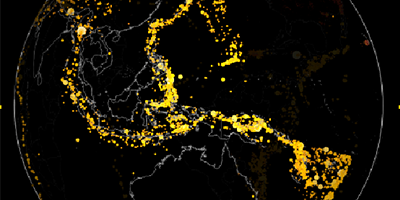Work in the Land of Lakes and Volcanoes (Trabajo en la Tierra de Lagos y Volcanes)
Most of the time I’ve spent working for Wolfram Research has been in the comfort of a climate-controlled office at our Champaign, Illinois headquarters. I’ve had easy access to my great co-workers, multiple computers and a Gigabit local network. I’ve had flexible working hours, a relatively short and pleasant bicycle commute, numerous delicious restaurants nearby and a window overlooking the beautiful campus of the University of Illinois (okay, and the roof of a McDonald’s).
All things considered, it’s a pretty good place to be. When I told Theo (my boss) that I wanted to give all this up and spend a year living in a Nicaraguan jungle, there was a bit of hesitation, but not much. We agreed fairly quickly that we could make it work.
Here’s where I was headed:


I actually had a pretty good reason to do this—my wife is a graduate student at the University of Illinois studying primate behavioral ecology. For her PhD dissertation she is investigating the feeding behavior of Nicaraguan mantled howler monkeys (Alouatta palliata).

So for the past year we’ve been living in a rural village on the side of a volcano on an island in a lake in Nicaragua:

Wolfram Research has a number of employees all over the world who work remotely (though I don’t think any others are quite this “remote”). Thanks to the company’s flexibility, all it takes is a computer, electricity, an internet connection and some discipline on the part of the worker.
Upon arrival I had the computer and the discipline, but flaky electricity and no internet. A couple of uninterruptible power supplies helped out with the frequent power outages. Additionally, our landlord was kind enough to help us arrange a wireless internet connection from a larger city across the lake.
Unfortunately, affordable broadband in the US did little to prepare me for the sticker shock I experienced upon learning the price of internet access in the developing world. Lacking other options, we signed up, and a short while later we had a “blazing” 128 kilobit-per-second internet connection—at almost 10 times the cost of much faster broadband in the US.
Incidentally, here’s the gross domestic product (GDP) of the United States compared to Nicaragua’s, which I found using the CountryData function in Mathematica.

A typical workday for me involves downloading the source code files for Mathematica, adding new features and fixing bugs, then uploading the files back to Wolfram Research. I use email to communicate with my coworkers, and if I’m lucky I can even get a VoIP (voice over IP) call to work.
Working in Nicaragua does have many advantages over working in the US. I took some time to catalog them here:
- Hammocks. Working in a hammock is every bit as good as it sounds (at least for the first hour or two).
- Scenery. Nicaragua is the land of lakes and volcanoes. Straight ahead through the tropical foliage I see the lake shore. Looming off to my right is an active 1600-meter-high stratovolcano. Behind me is an inactive 1400-meter-high volcano. There are no McDonald’s roofs in sight.
- Wildlife. Listening to monkeys howling and birds chirping is much more pleasant than car horns honking and tires screeching.
It’s not quite paradise, though. There are many disadvantages to working here as well:
- Slow, expensive internet. This has really forced me to make every byte count and not download more than necessary. When I need to download a new build of Mathematica I start it before going to bed and it’s finished around the time I wake up. In the office this takes only a minute or two.
- Heat. It’s 95° Fahrenheit every day, and we don’t have air conditioning.
- Ants, wasps, mosquitoes, etc.
After a year of hard work for both of us, my wife’s research is almost complete and soon we will be trading the volcanos of Central America for the cornfields of central Illinois. It has been a very memorable experience, but as far as work goes it has been business as usual.


